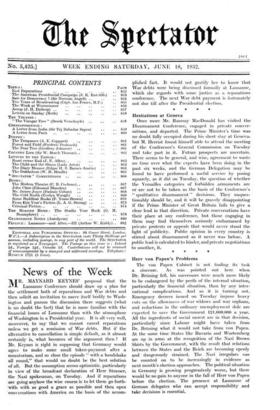Hesitations at Geneva
Once more Mr. Ramsay MacDonald has visited the Disarmament Conference, engaged in private conver- sations, and departed. The Prime itlinister's time was no doubt fully occupied during his short stay at Geneva. but M. Herriot found himself able to attend the meeting of the Conference's General Commission on Tuesday and take part in it. Future prospects are uncertain. There seems to be general, and wise, agreement to waste no time over what the experts have been doing in the past six weeks, and the German Delegation may be found to have performed a useful service by posing squarely, as it did on Tuesday, the question of whether the Versailles categories of forbidden armaments are or are not to be taken as the basis of the Conference's " qualitative disarmament " decisions. They unques- tionably should be, and it will be gravely disappointing if the Prime Minister of Great Britain fails to give a clear lead in that direction. Private conversations have their place at any conference, but those engaging in them may find themselves seriously embarrassed by private protests or appeals that would never stand the light of publicity. Public opinion in every country is stirred about disarmament as it never was before. A public lead is calculated to hinder, and private negotiations
to smother, it. * * * *








































